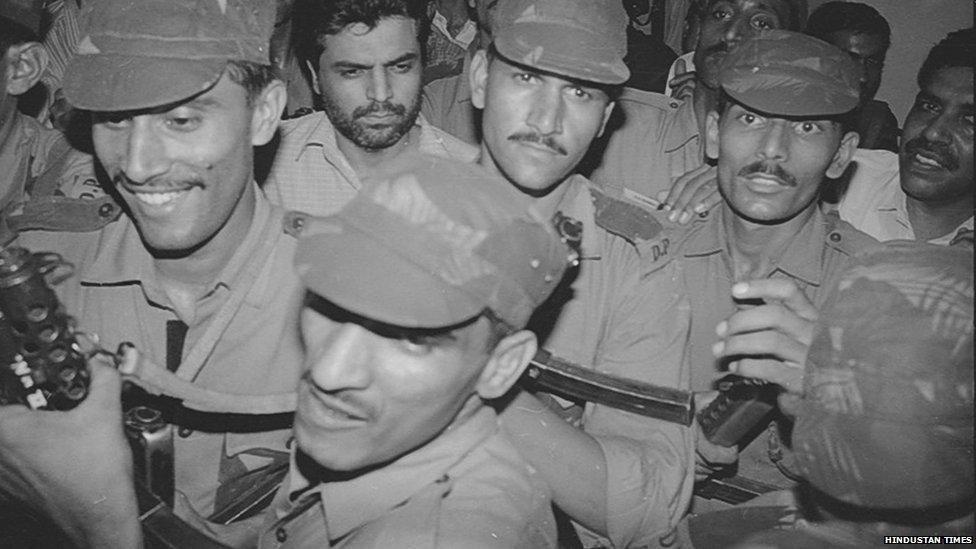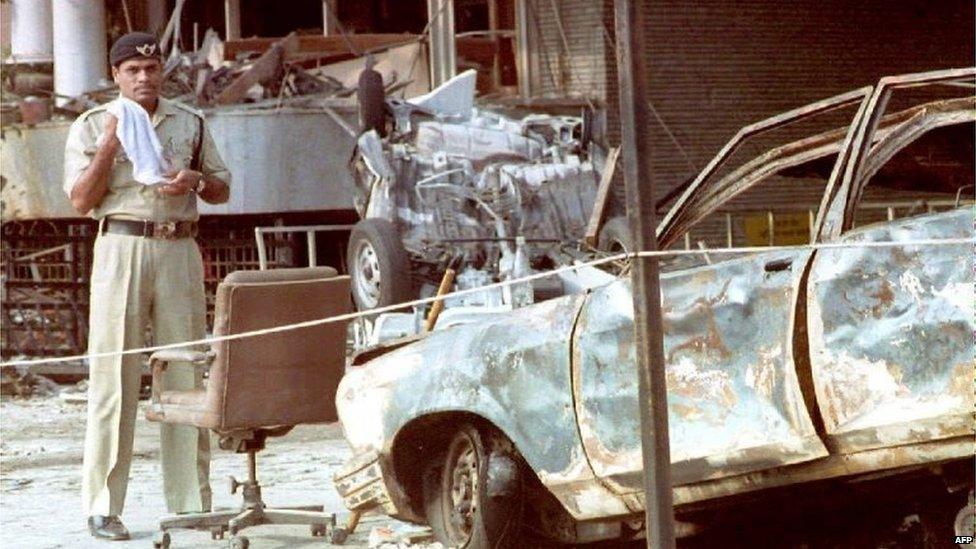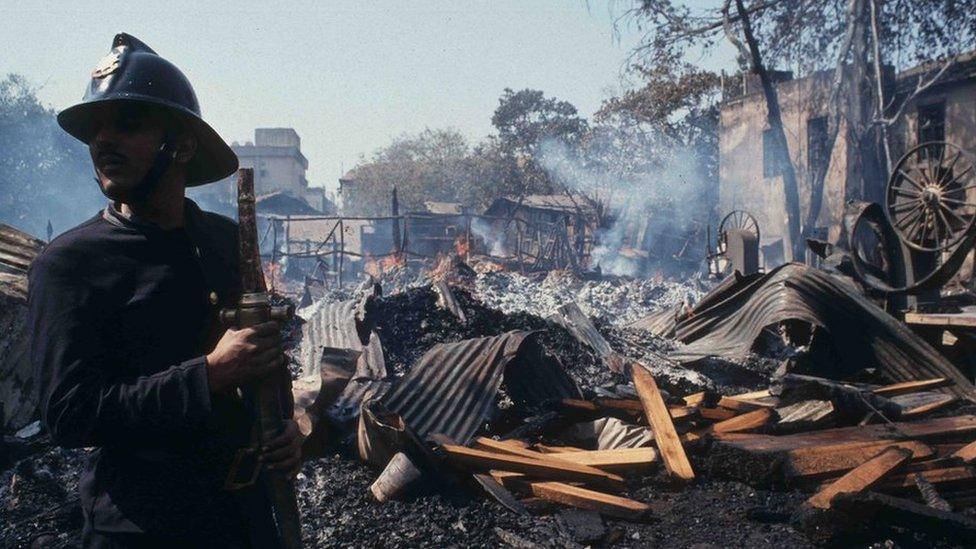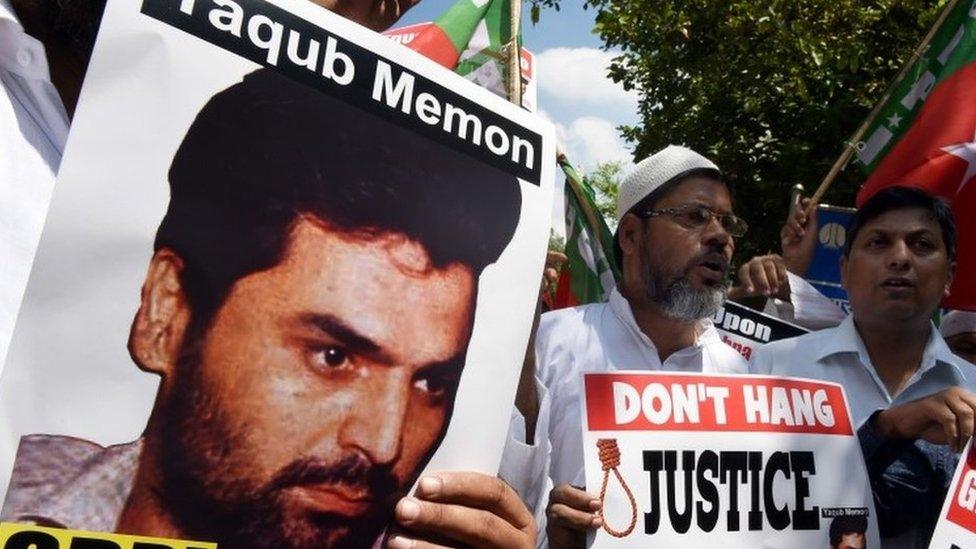India executes Mumbai bomb plotter Yakub Memon
- Published
Yakub Memon, who has been executed by hanging, tried using all legal routes to plead for mercy, as Yogita Limaye reports
India has carried out the execution of Yakub Memon, the man convicted of financing the deadly 1993 Mumbai bombings.
Memon was hanged at a prison in Nagpur in the western state of Maharashtra.
The serial blasts killed 257 people, and were allegedly to avenge the killing of Muslims in riots a few months earlier.
India rarely carries out death sentences - only three other people have been executed since 2004.
There was tight security around the Nagpur prison on Thursday morning, and in parts of the state capital, Mumbai.
The March 1993 blasts targeted a dozen sites, including the Bombay Stock Exchange, the offices of national carrier Air India and a luxury hotel.

Memon was sentenced to death in 2007 after being convicted of providing financial and logistical support for the bombings.
Memon was hanged hours after the Supreme Court dismissed a final plea to stay the sentence.
His lawyers had argued that executions can only be carried out after seven days have passed following the rejection of a mercy petition.
The court opened its doors in the dead of the night to hear his last appeal for mercy, but rejected it just before dawn.
The court ruled that because his first mercy petition had been rejected last year, the execution met the required rules, said media reports.

History of Mumbai attacks
March 1993: Series of explosions kill 257 people and injure 713
August 2003: Four bomb attacks kill 52 people
July 2006: Seven bombs go off on crowded trains within 11 minutes, killing more than 180 people and wounding hundreds
November 2008: Gunmen carry out a series of co-ordinated attacks across seven high-profile locations, including two luxury hotels, city's main commuter train station, a hospital, a restaurant and a Jewish centre, killing 165 people. Pakistan-based militants blamed for the attacks and peace efforts between the two countries derailed. Nine of the attackers also killed. Pakistani national Mohammad Ajmal Amir Qasab, who was captured alive, hanged in November 2012
July 2011: Three near-simultaneous explosions during Mumbai's evening rush hour kill 18 people and injure 131

Memon, a chartered accountant, was sentenced to death in 2007 by a special court in Mumbai after being convicted of providing financial and logistical support for the bombings.

The bombings killed at least 257 people in Mumbai
He was the only one of 11 people convicted for the bombings to have his death sentence upheld on appeal. The sentences on the others were commuted to life imprisonment.
The additional chief secretary of the state government confirmed to the BBC that Memon's body would not be buried inside the prison compound, and would be handed over to his family once a post-mortem had been carried out.

The Yakub Memon case
05 August 1994: Yakub Memon is picked up from the New Delhi railway station; he claims he gave himself up in Nepal eight days earlier.
27 July 2007: Twelve including Memon sentenced to death, 20 given life sentences.
21 March 2013: Supreme court commutes sentences of 10 but confirms death penalty for Memon, saying "his commanding position and the crime of utmost gravity" warranted no less.
May 2014: President Pranab Mukherjee rejects Yakub's mercy petition.
9 April 2015: Supreme Court rejects mercy plea, confirms death for Yakub.
30 July 2015: Supreme Court rejects final petition filed by Memon - he is executed hours later.

Memon's case has divided opinion in India, with many calling for the suspension of the death sentence.
Yakub Memon's brother, Tiger, is widely seen as having been the mastermind behind the attacks, alongside gangland boss Dawood Ibrahim. Both remain in hiding.
Several influential journalists, politicians and members of civil society had sent a letter to the president asking for him to "spare him from the noose of the death for a crime that was master-minded by someone else to communally divide India".
- Published30 July 2015

- Published29 July 2015
